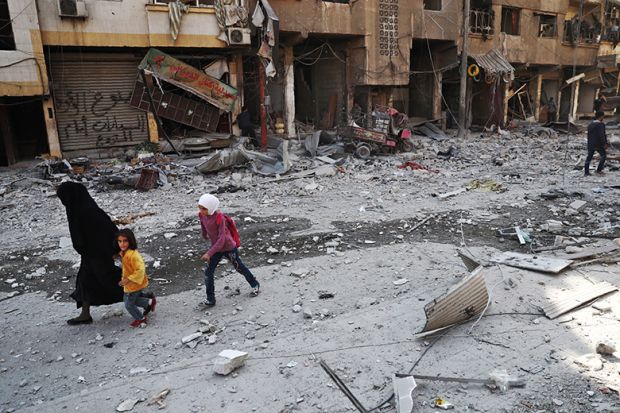A Syrian higher education sector dogged by overcrowding and staff shortages, with one university rehoused in a school basement while students and researchers struggle to heat their homes, is seeking support from wealthier nations.
That was the key message of two sobering presentations by Syrian academics at an event organised by the University of East London’s Centre for Migration, Refugees and Belonging on 26 February.
Sulaiman Mouselli, dean of the Faculty of Business Administration at the Arab International University, described an atmosphere of dislocation and disruption in his country. Like other private institutions, his had been moved into a “safe city” and was now operating from a hotel in Damascus.
Meanwhile, five branch campuses of one public institution, Euphrates University, had all been shut down, he said. Since those already enrolled were given the right to study elsewhere, this had led to immense overcrowding in the institutions that were still functioning, with up to 80 students sometimes crammed into a laboratory. The displacement of about 6 million people within Syria has inevitably caused huge psychological damage, meaning that universities can provide at best only rudimentary counselling and social support.
The main positive aspect is that the security situation has improved, Dr Mouselli told Times Higher Education, so students should soon be able to return to the AIU’s permanent campus on the road to Daraa, about 40km outside Damascus.
On the other hand, he was “struggling with the availability of academic staff”. He added: “I cannot rely on those who’ve got PhDs from inside Syria because they didn’t receive proper education during the crisis period.” Many potential applicants were leaving the country, he said – the men partly to avoid a system of military service that was often extended beyond the statutory single year.
In order to maintain “the quality and reputation” of his institution, therefore, Dr Mouselli has had to recruit staff from Lebanon or Jordan – and sometimes among Yemenis who had found refuge in Syria. Such people expected to be paid more than Syrian nationals, meaning that “tuition fees are going up, beyond the abilities of many students to pay”, he added.
Both staff and students also faced worsening difficulties in coping with basic needs for electricity, heating and gas. As a result, according to Dr Mouselli, “universities have to pay for generators”, which put further upward pressure on fees. Meanwhile, “when students go home, they don’t have electricity and are not in a good mood to study….You can’t do research if you are standing in line to get gas,” he continued.
Alia Omran is studying for a PhD in toxicology at the public Damascus University and also teaches at the private Qasyoun University. The former has suffered bomb damage, while the outbreak of war meant that the latter’s state-of-the-art new campus (also on the road to Daraa) was completely destroyed in 2010.
The first cohort of students therefore started their education in a temporary location, namely in the basement and on the roof of a secondary school in Damascus, although it is hoped that they may finally be able to occupy the repaired campus from the beginning of the next academic year. Meanwhile, inflation is eating into academic salaries and research grants for PhD students.
The two Syrian academics were on a tour of British universities organised by Al-Fanar Media and the British Council. So what sort of help are they looking for in their very difficult circumstances?
In her presentation, Ms Omran looked to the future and described ambitions to “collaborate on scientific research that meets our needs, such as public health issues, pollution and the environment, recycling” and to “establish a peer-reviewed online Syrian journal with both international and Syrian editors”, given that “we don't have a Syria-based journal on the known search engines like Scopus or PubMed”.
Her institution needed support in developing English language skills and particularly to address skill levels among “the teaching assistants or master’s degree students hired by the university instead of PhD holders” because of the brain drain. There was also room for more “distance learning to improve students’ and professors’ skills” and webinars to share educational materials, she said.
“We hope to rebuild our collaborations,” said Ms Omran. “There were great collaborations and student exchanges before the crisis. We want to reconnect.”
“Syrian higher education is running,” added Dr Mouselli, “but not running very well at the moment. We are doing our best to get funding for what we need but are not aware of all the funding bodies available inside Britain…In the short term, we are looking for online workshops and summer schools in Lebanon or Jordan to enable academic staff and students to join and raise their capacities.
“We are throwing out many ideas and hoping to catch some big fish.”




